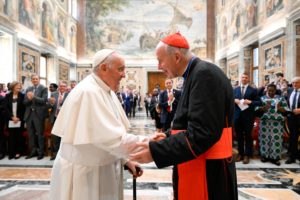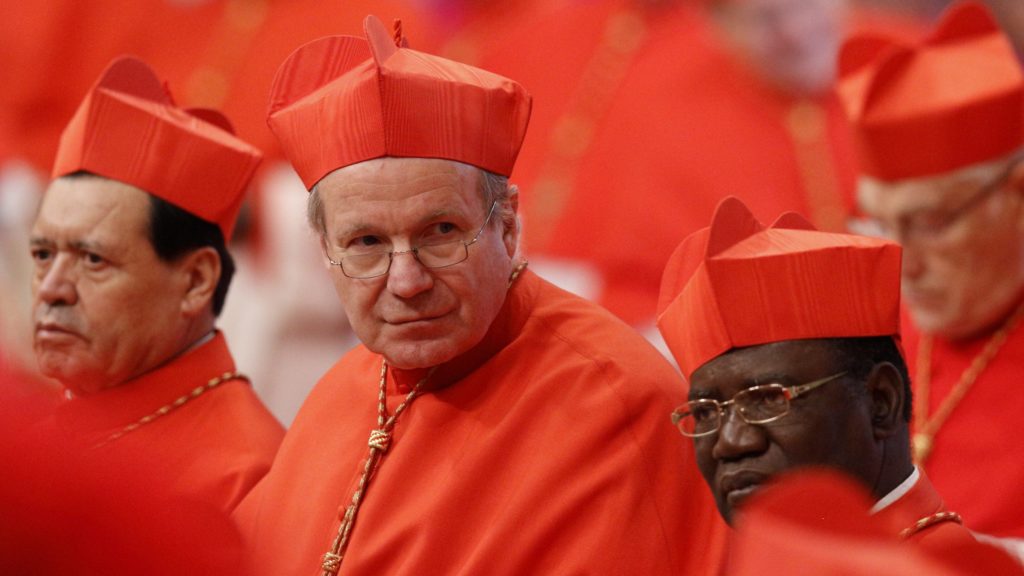ROME — Attentive observers of Catholic affairs who’ve seen a trailer for the new movie “Conclave,” based on the Robert Harris novel, will have noticed that the prelate played by Ralph Fiennes bears a striking resemblance to the real-life Cardinal Christoph Schönborn of Vienna, Austria.
Whether that’s intentional or not, it’s certainly apt, because Schönborn has been a lead actor in every Catholic drama of the last 30 years, including three papacies and two conclaves.
Now on the cusp of turning 80 and losing his right to participate in a third papal election, Schönborn recently had something interesting things to say about the destiny of Christianity in Europe — interesting, perhaps, not so much in terms of content, since it reflects things other have said many times before, but rather for the way it illustrates how Schönborn has managed not only to span the gap between the “Francis” and “Benedict” camps in Catholicism, but in some fashion to integrate them.
Before coming to that, a brief précis of Schönborn’s career is in order. To paraphrase another film, “The Princess Bride,” I won’t explain here, I’ll just sum up, because there’s just too much.
Born into a noble Austrian family which, over the years, has produced two cardinals and 19 archbishops, bishops, priests and nuns, in some ways Schönborn was thus destined to reach ecclesiastical heights. He joined the Dominicans and spent the next decade studying theology, including post-graduate studies under then-Father Joseph Ratzinger, the future Pope Benedict XVI, in Regensburg, Germany.
In the mid-1980s, he was the general editor of the new Catechism of the Catholic Church desired by St. Pope John Paul II. Named an auxiliary bishop of Vienna in 1991, he took over the top job in 1995 amid a nightmare clerical abuse crisis centered on his predecessor, the now-deceased Cardinal Hans Hermann Groër. That experience clearly left an imprint; years later he would clash with Italian Cardinal Angelo Sodano, the ultra-powerful secretary of state under John Paul, over the handling of the abuse case against Father Marcial Maciel Degollado, founder of the Legion of Christ.

In the 2005 conclave Schönborn played the role of kingmaker, mobilizing support for Ratzinger, and went on to be an important adviser during his papacy. Often mentioned as a possible papal candidate himself, Schönborn has emerged over the past decade as a key ally of Pope Francis too, lending critical support on his most controversial decisions, including his overtures to divorced and civilly remarried Catholics and also the “LGBT” community.
Given that background, Schönborn is among a handful of figures in the Church of whom it can clearly be said, “When he talks, people listen.”
All of which brings us to his recent interview with the French Catholic publication Famille Chrétienne, in which Schönborn declared that Christians must “accept the decline of Europe,” asserting that declining birth rates among native Europeans and rising levels of Islamic immigration pose serious challenges to Christianity on the old continent.
“We tend to gaze at our ecclesiastical navel, but it [Christian decline] is an undeniable continental movement,” while nevertheless insisting that there remain pockets of energy and hope, suggesting the Church “has not yet breathed its last.”
Listeners familiar with the thinking of Benedict will detect in that forecast an echo on the late pontiff’s description of the future of Christianity in the west as that of a “creative minority,” first laid out before his election in a small book titled “Europe: Its Foundations Today and Tomorrow” (Ignatius Press, $14.95), published in 2004.
In it, the future pope contrasted two models for understanding what the European future might hold. One was that of Oswald Spengler, who believed in a natural life cycle for civilizations — they’re born, they have a growth spurt, they level off in middle age, and eventually they grow old and die. The other vision was that of Arnold Toynbee, who argued that a civilization could regenerate itself through a new injection of moral purpose, supplied by “creative minorities” within the culture.
Yet in the same breath, Schönborn also channeled Francis in his Famille Chrétienne interview by insisting that rather than seeing the growing Islamic presence as a threat, Christians should actually welcome it.
Schönborn advocated a “fraternal rapprochement” with Islam, echoing the words of Francis, noting that Christians “do not take up arms but trust in the work of grace.” He noted that both Christianity and Islam have an “absolute appeal,” meaning that “neither of them can renounce their mission,” but that doesn’t have to imply conflict.
Schönborn also praised Francis’ ongoing Synod of Bishops on Synodality, saying the point is less about specific outcomes than a new modus operandi in the Church, and also the pontiff’s call for discernment in concrete cases on matters such as blessing same-sex unions.
One can, of course, debate the particular points Schönborn makes, but what’s striking is how seamlessly he moves from observations that appear to echo his great mentor, Benedict, to positions that clearly reflect the outlook and agenda of Francis. Importantly, his doing so doesn’t feel artificial or manufactured — it comes off, instead, as the nimble approach of a mind unwilling to be circumscribed by ideological categories.
For that reminder, however inadvertent, that Catholicism at its best is not about choosing one side or the other in its internal tensions, but rather seeking a creative synthesis of both — a point made, inter alia, by Benedict in a 2006 address to Italian clergy — the Church probably owes the erudite Dominican cardinal, now possibly nearing the end of his remarkable career, a note of gratitude.

